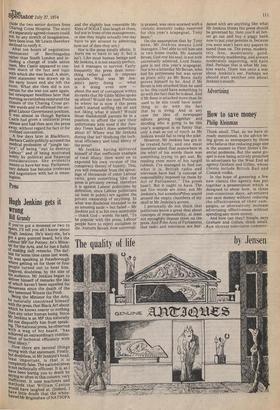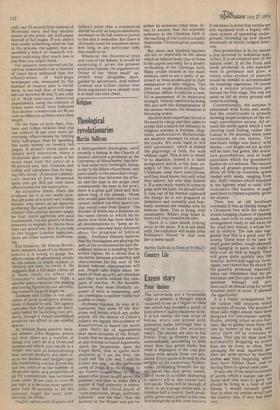Advertising
How to• save money
Philip Kleinman
Think small. That, as we have already mentioned, is the advice being given to newspapers by those who believe that reducing page size is the answer to Fleet Street's financial problems. But the same gospel is now being actively preached to advertisers by the West End ad agency Graham and Gillies, whose clients include British Rail and Cossack vodka.
In the hope of garnering a few new clients the agency has put together a presentation which is designed to show how, in these cost-conscious days, advertisers can save money without reducing the effectiveness of their campaigns, or alternatively increase advertising effectiveness without spending any more money. And how can they? Simple, says Graham and Gillies, think small. Run shorter television commer cials, say 15-second films instead of 30-second ones, and buy smaller spaces in the press, say half-pages instead of full pages. If you object that surely something must be lost in the process, the agency has assembled a batch of research evidence indicating that much less is lost than you might think.
For instance, tests carried out by. various researchers over a number of years have indicated that the effectiveness of half-page newspaper ads, measured by the number of readers able to recall them, is not half that of full-page ads but between 60 and 71 per cent of it. With television, American experiments, using the criterion of brand name recall, have indicated that shorter commercials are 92 per cent as effective as films twice their length. On the basis of such data, Graham and Gillies reckons that you can achieve 42 per cent more advertising effectiveness by buying forty half-pages than by spending the same money on twenty full pages. It doesn't work quite so simply with television, since a 15-second spot costs quite a bit more than half the price of a 30-second one, but Graham and Gillies still calculates that by buying fifty-seven 15-second commercials instead of forty 30-second spots you get 26.6 per cent more effectiveness for the same price.
An attractive thesis. Since the evidence for it is not really new, though some of it is not very widely known, why aren't all ad agencies proffering the same advice to their clients? One cynical answer might be that, since agencies are paid commission, it is not greatly in their interests to explain to clients how they can spend less. But, if you talk to the bigger London agencies, there are other answers forthcoming.
For instance, Dr Simon Broadbent, research head of Leo Burnett, *believes it is wrong to gauge the effectiveness of advertising simply by, the extent to which readers or viewers are able to recall it. He suggests that a full-page colour ad is more likely to affect the 'consumer's behaviour than a smaller space whatever the reading and noting figures (to use advertising research jargon) might be.
Graham and Gillies is not oblivious of such qualitative distinctions, it should be said. The agency concedes that full pages are inevitably better for launching new products, though it thinks established products can afford to use smaller spaces.
At Hobson Bates another eminent adman, John Hughes, points out that there are a number of things you can't do in a 15-second commercial which you can do in a longer one, such as demonstrating how certain products are used or, as in the Benson and Hedges cigar ads, establishing a mood. If over the last ten years or so the number of 30-second spots, as a proportion of all TV commercials, has increased from under 50 per cent to over 60 per cent, it is because most agency men find 30 seconds to be the optimum length for most commercials, he thinks.
Hughes agrees with Graham and Gillies's point that a commercial should be only as long as absolutely necessary to do full creative justice to the idea it embodies. But there is obviously room for argument about how long, in any particular case, that needs to be.
Whatever the theoretical pros and cons of the debate, it would be surprising if, given the present economic climate, the arguments in favour of the "think small" approach went altogether disregarded by advertisers. And indeed Graham and Gillies claims that those arguments have already won it at least one new client.




























 Previous page
Previous page